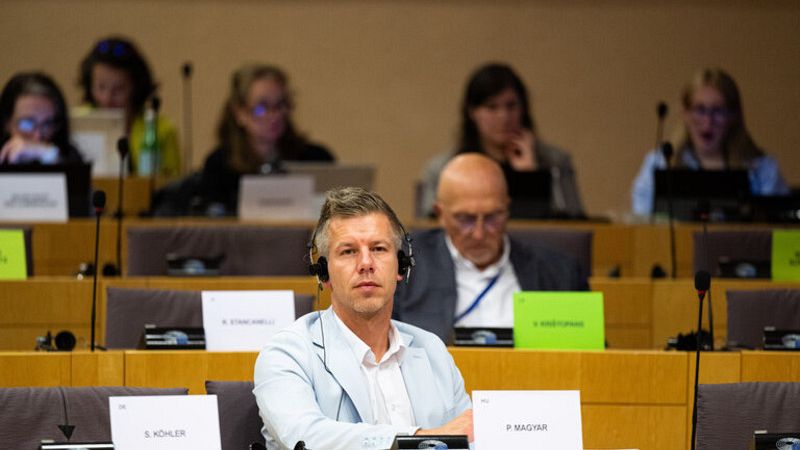
The European Parliament’s Committee on Legal Affairs (JURI) is set to vote today on whether to lift the immunity of five members of Parliament, including Hungarian opposition leader Peter Magyar and Italian left-wing firebrand Ilaria Salis.
The 25 lawmakers on JURI will vote secretly on seven requests to strip immunity, making a recommendation on whether to approve or reject them.
The final decision on each case will then be taken by the Parliament in a plenary session, where all MEPs can confirm or reverse the vote of their colleagues in the JURI Committee. If their immunity is waived, national authorities can go ahead with legal proceedings against an MEP, while they still keep their seat.
Three of the seven requests target Hungarian MEP Peter Magyar, founder and leader of the opposition Tisza party, wanted by his own country’s authorities for theft and defamation.
Hungary’s judiciary also issued requests to waive the immunity of Klára Dobrev, a Socialist Hungarian MEP, and Salis, an Italian lawmaker from the Left group.
The two remaining requests concern Michał Dworczyk and Daniel Obajtek, both members of the Conservative Polish party Law and Justice (PiS), and wanted by the Polish authorities.
Péter Magyar claims it's 'political'
Hungarian authorities have asked the European Parliament to lift the immunity of Péter Magyar three times.
The first request was sent by Hungary's Chief Prosecutor's Office and is related to allegations that Magyar threw a man's phone into the Danube River after an argument in a Budapest nightclub with a man who was filming him.
The second case against him relates to a former member of the Hungarian Parliament, György Simonka, who sued Magyar for defamation. The third court case, initiated by the far-right Our Homeland Movement in Hungary, is also for defamation.
If Magyar were to lose his immunity, Hungarian authorities could investigate and charge him for these offences, all viewed as politically motivated by the opposition. The Tisza party is the biggest challenge to the power of Viktor Orbán's Fidesz in Hungary, with recent opinion polls showing Tisza leading, if elections were held now.
“I think it's obvious to everyone that this is a political issue. I'm a forty-four-year-old lawyer with three children, a clean record, who has had national security clearances for more than half of the last two decades, because of my jobs and because of my ex-wife. And they've never found anything,” Magyar claimed when he was quizzed by the JURI Committee, referring to his ex-wife, Judit Varga, who was the justice minister of Hungary.
However, it's unlikely that Magyar will lose his immunity. He is part of the centre-right European People’s Party (EPP), the largest group in the Parliament, and will probably also be defended by the Socialists and Democrats, Renew Europe, and the Greens/EFA.
Ilaria Salis’ immunity at risk
Ilaria Salis’ case could prove more risky.
The Italian lawmaker was arrested in February 2023 in Budapest on the sidelines of an anti-fascist demonstration held on the so-called Day of Honour, a neo-Nazi gathering in Europe, where she was accused of assaulting and beating two far-right militants.
At the time, Salis was a teacher and human rights activist who had spent time squatting in Northern Italy. She spent more than 15 months in pre-trial detention in Hungary, claiming to have suffered extremely harsh conditions and violations of human rights.
The footage of her being led to the trial in chains and her denunciations of mistreatment in Hungarian prisons sparked outrage in Italy, leading the government to summon Hungary's ambassador ,and Italian Prime Minister Giorgia Meloni raised the issue with Hungary’s Viktor Orbán.
Thanks to a popular mobilisation, Salis was elected to the European Parliament in June 2024 with the Alliance Greens-Left (AVS) party, joining The Left group and regaining her freedom through parliamentary immunity.
Hungarian law allows elected MEPs to take their seat, but a few months after the election, the Hungarian authorities asked the European Parliament to lift her immunity in order to conclude the trial. Should this happen, Salis would risk being detained again.
“In Budapest I would face a show trial, without the most basic democratic safeguards, in a country where the judiciary is not independent and the head of government has already declared my guilt even before the first-instance verdict. For charges considered minor elsewhere, I could be sentenced to 24 years of hard prison,” she said in a note ahead of the vote.
Last week, Zoltan Kovacs, international spokesperson of Hungary’s Orbán, posted on X the geographical coordinates of Márianosztra Prison, suggesting this is the place where MEP Salis should end up.
According to Parliament sources, in this case, the EPP could support the immunity waiver request, voting with the right-wing European Conservatives and Reformists (ECR) and the far-right Patriots for Europe (PfE).
Klára Dobrev is also under scrutiny
Socialist MEP Klára Dobrev is also at the centre of a legal controversy in Hungary. She was accused in March 2024 of the crime of public defamation, for having claimed that a local official was involved in a paedophilia scandal that led to the downfall of Hungary’s President Katalin Novák and Justice Minister Judit Varga. Hungarian authorities asked the Parliament to lift her immunity a year ago.
MEP Tineke Strik from the Greens/EFA group, rapporteur for the Rule of Law situation in Hungary, claims that all the requests put forward by the Hungarian judiciary are politically motivated.
“The rule of law is not respected at all in Hungary. Judicial bodies like the Prosecutor’s office and the Supreme Court are totally captured [by the political power]. So, even if the judges of first instance deliver a judgment in good faith, the government could get what it wants at a higher level,” she told Euronews.
Polish far-right MEPs claim 'political revenge'
The two MEPs from PiS who are under scrutiny also claim political motivation behind the requests to waive their immunity.
Michał Dworczyk was the victim of a cyberattack in 2021, when he was head of the cabinet of former Polish Prime Minister Mateusz Morawiecki, with his private inbox hacked and leaked online.
After the change at the helm in Warsaw, the new Prosecutor General and Minister of Justice Adam Bodnar concluded that in the cyberattack, Dworczyk failed to fulfil obligations as a state official, acting to the detriment of the public interest, and obstructing criminal proceedings, by “using an uncertified and unsecured private email box for conducting correspondence”.

Minister Bodnar also asked for MEP Daniel Obajtek’s immunity to be lifted. Obajtek is accused of giving false testimony in court and of unlawfully restricting the distribution of the left-wing magazine Nie at gas stations belonging to Orlen, the multinational oil refiner that he was presiding over as CEO.
“The cover [of that magazine] desecrated the cross, and I would have made the same decision regardless of whether it offended the religious feelings of Christians, Muslims, or Jews. The Polish prosecutor's office wants to strip me of my immunity, just because I opposed offending religious feelings. It's hard not to call this political revenge,” he told Euronews.







